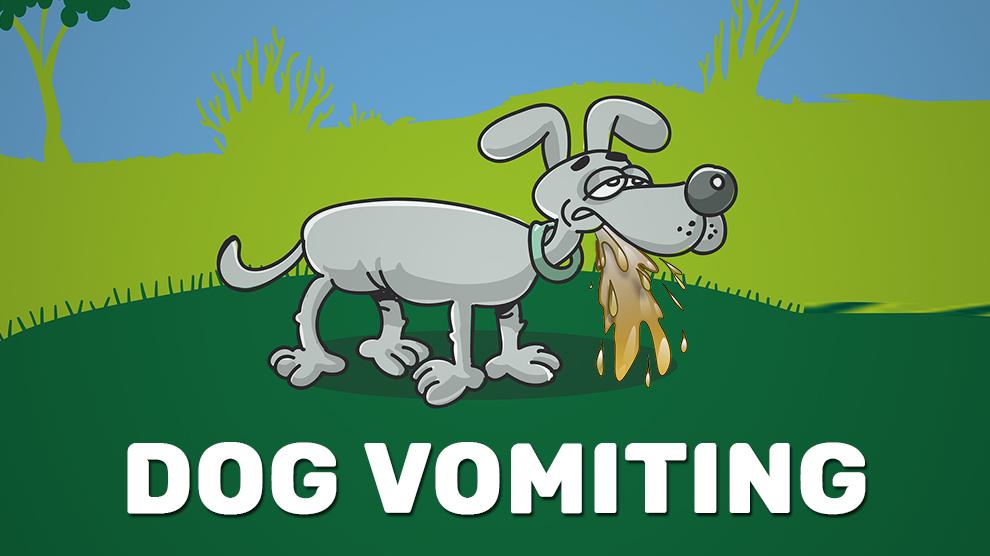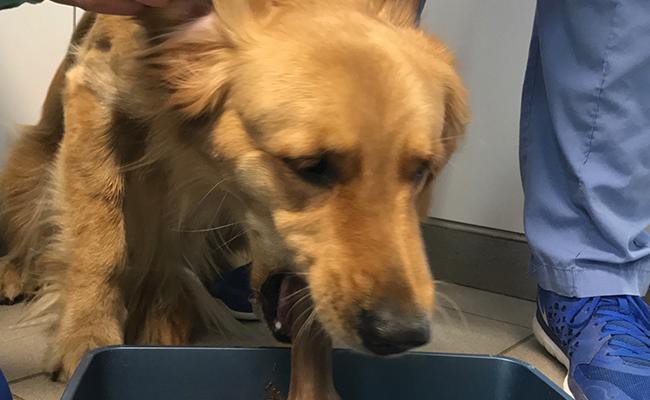- Reasons For Dog Vomiting
- What Other Signs Should I Take A Note Of?
- Colors Of Vomit, Reasons, And Immediate Treatment
- When Should You Meet Your Vet?
- What Kind Of Diagnosis Will My Vet Carry Out?
- How To Handle Your Dog In The Treatment Period?
- Best Natural Home Herbal Remedies To Stop Vomiting In Dogs
- Popular Home Remedies For An Upset Stomach
- What Is Nausea In Dogs?
- Reasons For Nausea In Dogs
- How To Handle A Pet With Nausea?
- How To Stop Nausea In Dogs?
- Cost Of Treating Nausea (Parvovirus)
Dog Pregnancy Calculator And Timeline
Dogs are easily susceptible to stomach problems and irritable bowels, just like their masters. Pet owners normally miss the trick until they find their dogs vomiting.
In these scenarios, the home remedy for dog vomiting works to some extent. Vomiting is a known problem in pets and as long as it is not frequent there is nothing to worry about.
Reasons For Dog Vomiting
Your furry friend may vomit simply for the fact that he’s gobbled too much food or consumed something unhealthy. Vomiting should be treated with the utmost importance because it may indicate something that needs regular medical help.
In some cases, vomiting can be linked to systemic and gastrointestinal disorders and this needs a thorough examination by a vet.
Some of the main reasons for vomiting in dogs include:
- Infected uterus
- Car sickness
- Heatstroke
- Bloat
- Anaesthetic agents
- Viral infections
- Intake of toxic materials
- Post-operative nausea
- Pancreatitis
- Gallbladder inflammation
- Acute kidney failure
- Intestinal parasites
- Presence of foreign objects
- Diet-related causes
- Bacterial infection
Vomiting that happens irregularly or sporadically over a sustained period can happen due to some health conditions like:
- Systemic illness
- Liver disease
- Kidney dysfunction
- Cancer
- Severe constipation
- Intestinal inflammation
What Other Signs Should I Take A Note Of?
Other signs to watch out for include:
- Decrease or increase in urination or thirst
- Change in appetite
- Weight loss
- Blood in vomit
- Laziness
- Dehydration
- Diarrhea
- Frequency of vomiting
Colors Of Vomit, Reasons, And Immediate Treatment
1. Dog Vomiting Yellow
If your dog vomits yellow mucus, you should contact a vet at the earliest. The untold physical troubles can cause severe discomfort and in the process, the throat, esophagus, and stomach may become ruptured.
Yellow mucus vomiting may indicate the presence of bile juice in your dog’s vomit.
Reasons or Causes of Yellow Mucus Vomiting in Dogs
- Pancreatitis refers to the inflammation present in the pancreas. This condition can be either chronic or acute.
- Pancreatitis can lead to injury and can cause severe operational dysfunction of the pancreas.
- Due to an intestinal blockage, your dog can vomit yellow mucus.
- The empty stomach may cause bile to damage your dog’s stomach forcing the dog to vomit yellow mucus or bile juice.
Treatment for Yellow Mucus Vomiting in Dogs
The treatment for this condition in dogs actually will be based on the observation gathered by your vet.
Giardia
- Giardia is managed with metronidazole or fenbendazole. Vets will recommend a complete clean-up of the dog to reduce any parasite eggs.
- Wash all your dog’s toys, bedding, and bowls in hot water.
- Disinfect and clean upholstery, carpets, and flooring.
Gastritis
- Patients suffering from gastritis may need food withdrawn for 2 days or less.
- Small quantities of food can be fed after 24 hours.
- Increase food intake slowly each day.
- Sucralfate medicine will help your dog feel good.
Bilious Vomiting Syndrome
- Dogs suffering from bilious vomiting syndrome may require smaller meals.
- Pepcid or Tagamet may be given to control acidic condition in your dog.
Inflammatory Bowel Disease (IBD)
In this case, your vet may suggest one carbohydrate and protein for some time- sweet potato and chicken. After some time, new items such as potato or lamb will be introduced.
IBD patients have been prescribed probiotics, antibiotics, drugs, and immunosuppressive drugs.
Intestinal Blockage
- The vet may suggest surgery after finding out whether there is a real blockage or not.
- Pain medication and antibiotics are given to reduce the severity of the condition.
2. Green Vomit
If your dog vomits very rarely, then there is no reason for you to panic. Many pets will vomit when they eat something unhealthy.
Causes of Green Vomit
Main causes of green vomit in dogs include:
Green Plants
- Inspection of the green vomit can expose the mix of digestive plants and fluids.
- Check your houseplants and verify what types of leaves are present in the green vomit.
- Most plants are toxic to dogs. If you suspect a plant to be toxic, please remove it from your house immediately.
Infections
If you find mucus in your dog’s vomit, then it could be due to a stomach infection. Take a vomit sample when you visit your vet.
Bile
Gastritis could also result in green vomit in dogs. Green bile is discharged in the gallbladder and thereby into the duodenum.
Treatment for Green Vomit
Even healthy dogs vomit and you should also look out for other signs such as diarrhea etc. Contact your vet for the best possible medical care.
3. Dog Vomiting White Foam
When you find your dog vomiting white foam, it will open a dozen questions ranging from “Is it that serious? Should I call the vet right now or not?” and much more.
Reasons for White Foam Vomit
Bloat
This condition occurs when your dog’s stomach is filled with gas and remains twisted. Bloating means your dog is finding it difficult to expel gas.
Bloating puts severe pressure on your pet’s diaphragm, and ultimately reducing blood supply to your pet’s heart. Signs of bloat include an inability to pass stools, a consistent cough, pale gums, excessive drooling, and vomiting white foam.
Infectious Tracheobronchitis
Most dogs develop an infection known as kennel cough or infectious tracheabronchitis after been placed in a kennel. Dogs can simply develop this condition due to regular visits to doggie daycare.
Signs of infectious tracheabronchitis include vomiting white foam, nasal discharge, lethargy, and frequent cough. Bordetella vaccine can stop this kennel cough in dogs.
Pancreatitis
Acid reflux could also result in your dog vomiting white foam. Signs of pancreatitis include weakness, abdomen pain, loss of appetite, and dehydration. Dogs suffering from pancreatitis will display the “praying position.”
Parvovirus
A very serious viral condition and signs of parvovirus include unexplainable weight loss, bloody diarrhea, fever, and vomiting white foam.
Kidney Problems
A dog showing signs such as disorientation, weakness, lethargy, and vomiting white foam, kidney trouble cannot be ruled out. Call your vet at the earliest or else the consequences could be life harming.
Indigestion
Indigestion is a regular occurrence and there is no need to ring the alarm bells unless you find it happening quite regularly.
Undigested food could also cause white foam vomit and contact your vet if you feel something is really bad.
Treatment for Vomiting White Foam in Dogs
If you feel your dog is undergoing a simple indigestion problem, then food restriction can produce good results. For continuous urination in dogs, a thorough analysis is only recommended.
Pancreatitis and bloat, depending on the severity of the condition can require further investigation.
4. Dog Vomiting With Blood
Hematemesis in dogs
Vomiting of blood or hematemesis can happen due to several reasons. If blood is present in your dog’s vomit, it should be treated with sincerity and care.
Your dog could also show signs such as blood in stool, fever, and diarrhea. Dark stools do not signify blood. Another point is that traces of blood may not represent gastro intestinally and then regurgitated.
Reasons for Blood Vomit in Dogs
Injury and illness
One of the main reasons for blood vomit in dogs is blood clotting disorder. It can happen as a result of medical or injury procedures. Kidney or liver disease, illnesses, improper surgical procedures, and injuries can also result in blood vomit in dogs.
Other factors such as cancerous tumors in the skin, esophagus, and stomach can also cause blood vomit.
Ingestion
NSAIDs are prescribed for inflammation and pain in general. Inform your vet about other medications you are giving your dog. Toxic materials can affect the gastrointestinal system, blood-clotting ability, central nervous system, and other organs.
Gastrointestinal Ulcers
Intestinal and stomach ulcers are acid-based injuries occurring due to the defect of the mucosa membrane. These ulcers are a result of neoplasia, and liver disease.
Treatment for Blood Vomit in Dogs
- In most cases, a vet will prescribe tests to study white blood cells, anemia, and coagulopathy.
- Urinalysis may also be carried out.
- The vet may order further tests if the exact cause remains unknown.
- There is no simple home treatment for blood vomit in dogs unless particularly mentioned by a vet.
5. Vomiting Pink Foam
Reasons for Pink Foam Vomit
- Dogs suffering from lung infections, lung cancer, and congestive heart failure are known to vomit
- Pink foam.
- If the vomited matter is frothy pink, it could have been discharged from the lungs.
Treatment
Contact your local vet for further diagnosis.
6. Vomiting Brown Liquid
Vomiting brown liquid could indicate something more serious.
Reasons for Vomiting Brown Liquid in Dogs
Hemorrhagic gastroenteritis
- In this condition, you expect your dog to vomit digested blood.
- Hemorrhages can cause anemia or blood pressure in dogs
- Warning signs include excessive blood loss, pale gums, weakness, and lethargy
Consuming rat poison
If your dog consumes rat poison, it can lead to black stools and vomiting blood.
Something they ate is in brown color
If your dog has consumed feces, dirt, or chocolate, it can easily result in brown vomit.
Intestinal Blockages
Intestinal blockages can also cause brown liquid vomit. Things like marbles, toys, underwear, button, coins, and bones are some items collected from a dog’s stomach. A foul smell accompanies the brown vomit in most cases.
Bleeding Ulcers
Ulcers could also result in your dog vomiting brown liquid. Black colored stools also indicate bleeding ulcers. The main causes of ulcers include shock, stress, pancreatitis, intervertebral disk disease, ingestion of foreign things, etc.
Treatment
Stomach ulcers can be easily treated but in certain cases, it may require surgery and hospitalization. Some dogs may also need electrolytic support, blood transfusions, and proper supportive care.
7. Vomiting Mucus
If you find your pet vomiting mucus, it could mean that your dog is coughing and not vomiting. The ribs and chest of a dog move visibly while coughing.
Reasons for Vomiting Mucus
- When you inform your vet that your dog is vomiting mucus, your vet will eliminate coughing and regurgitation.
- Regurgitation happens due to a problem in your dog’s esophagus, throat.
- Coughing mucus happens when your dog’s heart, sinus, respiratory, or esophagus is not in the best of health.
- Other reasons include blockage, inflammatory bowel disease, toxins, and diet.
Treatment
Your vet will study the complete medical history of your dog and may prescribe certain tests. Some of the tests include a sonogram, fecal exam, a total blood count, urinalysis, and x-rays.
The pet’s diagnostic test, physical examination, and dog’s medical history will guide your vet in deciding on the best possible treatment.
When Should You Meet Your Vet?
You should meet your vet if
- Continuous vomiting for days together
- Fever in dogs
- Bloating in the stomach region, chronic diarrhea, heaving, hacking, nervousness, and lethargy
- Dogs suffering from diarrhea and vomiting might require IV fluids
- Observe your vet and if home remedies do not work then a vet visit is necessary
Contact your vet as soon as you notice any of the signs mentioned earlier if your canine friend vomits at least twice or thrice a day or if he vomits continuously non-stop.
What Kind Of Diagnosis Will My Vet Carry Out?
Depending on your dog’s signs, physical examination findings, medical history, and age, your vet may recommend several tests to identify the exact cause of this problem.
How To Handle Your Dog In The Treatment Period?
You can feed your dog with cooked skinless chicken and rice, and boiled potatoes. In certain cases, some dogs may need antiemetics, a diet change, antibiotics, and fluid therapy. Please follow your vet’s suggestion until your dog completely recovers.
Best Natural Home Herbal Remedies To Stop Vomiting In Dogs
Contact a holistic vet because a dog’s digestive tract is very sensitive.
A few choices you can try include
Car sickness – Indian cockles or Cocculus effectively treats car sickness. Try feeding this to your dog before the actual travel.
Ginger, chamomile, fennel, and catnip herbs – Herbs such as these easily pacify an irritated stomach. Add herbs to a ball of cooked meat.
Digestive enzymes – Dogs normally do not manufacture enough enzymes to digest their food naturally. The pet food available in stores is free from enzymes and this naturally creates stomach issues for dogs.
Kefir – Kefir refers to fermented milk and it contains probiotics that invariably soothe your dog’s intestinal tract. Add probiotic supplements and powders to your pet’s food.
Popular Home Remedies For An Upset Stomach
The best home remedy for vomiting refers to a change in the feeding schedule for your dog. Fasting effectively cleans your dog’s digestive tract.
Dogs living in the forest normally skip their meals at least for a day. Feed your dog with completely watery rice porridge. Best foods to handle irritating stomach include sweet potatoes, oatmeal, yogurt, bananas, and pumpkin.
What Is Nausea In Dogs?
Nausea is noted when your healthy dog stops eating food and you find your dog eating grass. You also notice your dog vomiting and gagging.
Several factors lead to nausea in dogs, but frequent vomiting commands a vet inspection at the earliest.
- Unnecessary exposure to hazardous chemicals or toxins
- Intestinal obstruction
- Parvovirus
- Motion sickness
- Gastroenteritis
Reasons For Nausea In Dogs
Toxin exposure
At times, curious dogs come in touch with toxic plants and chemicals. Bone or blood meal, used in gardening, can easily harm your dog.
Water containing algae is unhealthy for dogs, but dogs ingest unclean water just like that. All mushrooms are not safe for dogs.
Intestinal obstruction
Dogs may accidentally chew and swallow small pieces of their toys and this could result in nausea, vomiting, and also diarrhea.
Most dogs may exhibit signs of abdominal pain, burping, and drooling. Call your vet because some cases might require surgery to remove them.
Parvovirus
Parvovirus affects small puppies as young as four months. This virus normally spreads from one dog to another, in leashes and collars, and common water bowls.
Parvovirus can lay inactive in winter and show presence in the months of summer. Parvo is a dangerous virus and bloody diarrhea and continuous vomiting are signed of parvovirus attack.
Motion Sickness
Just like humans, even dogs can exhibit motion sickness. Limiting your dog’s water and food and anti-nausea treatment can reduce motion sickness.
Gastroenteritis
Roundworms can cause nausea and vomiting in dogs. In some cases, vomiting and nausea can also be linked to kidney failure or cancer in dogs.
This health condition comes under the common name of gastroenteritis.
How To Handle A Pet With Nausea?
Non-potable water, dangerous chemicals, and poisonous plants are also connected to nausea. Contact your vet and your vet will check for other problems such as electrolyte imbalance and weight loss.
How To Stop Nausea In Dogs?
Always store the blood meal in a safe place and you move away from low-quality dog toys that can break easily. Rawhide chews and plastic toys can be broken into small pieces and swallowed.
Update your dog’s vaccination and keep your dog safe from other strange dogs.
Cost Of Treating Nausea (Parvovirus)
The price of parvovirus medication will depend on the level of the virus when the vet injects the medicine.
Possible IV fluids start from $50 and can touch $500. Medicines to control parvo usually cost between $60-$120. The total cost of treating nausea in dogs can be between $50-$1000.





















